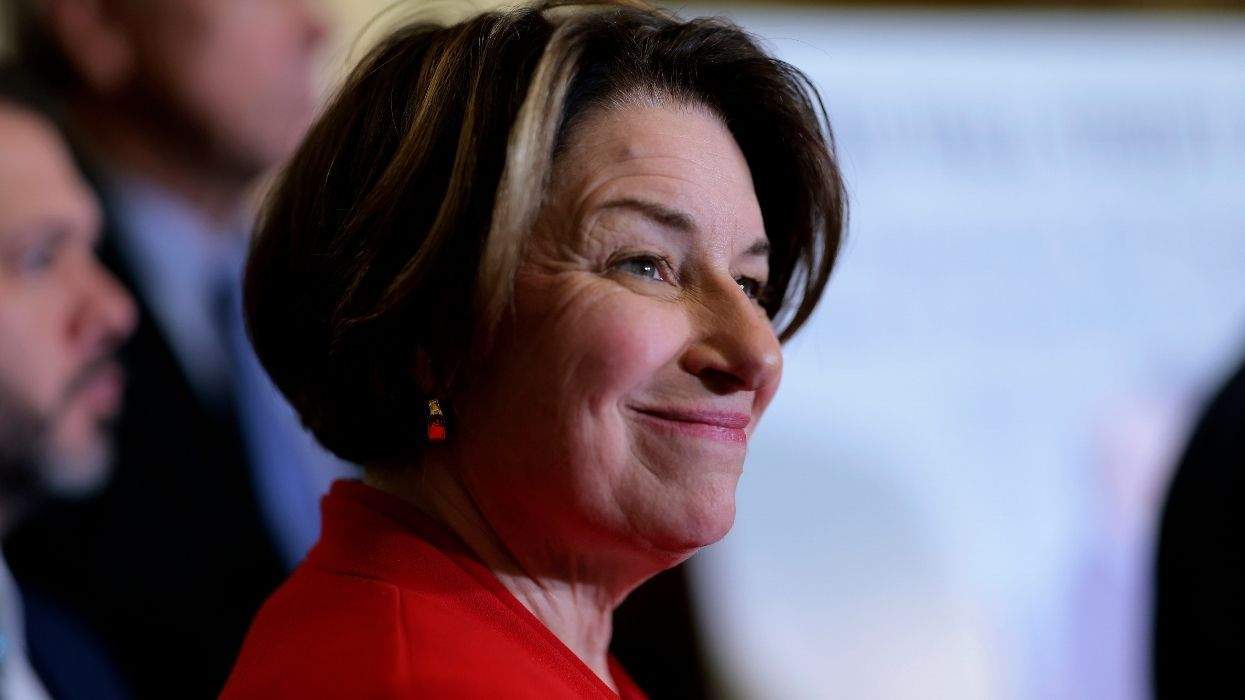Kyrsten Sinema expressed increasing confidence about her prospects of winning the race for the 9th Congressional District in Arizona, telling a local news station Wednesday morning that, "It appears our lead is growing."
"We knew it was going to be a close race," the Democratic former state lawmaker said in an interview with 3TV. "What we're really happy about it that we've been steadily ahead since the numbers started coming in and it appears that our lead is growing. So, we're optimistic about the next couple of days."
Sinema maintains a slim lead over Republican Vernon Parker. The race in Congressional District 9, a district with many independent voters that covers Phoenix, is the most competitive contest in the state, according to the Arizona Republic.
The outcome may not be finalized for days. Watch the new interview with Sinema below.
Both candidates for the U.S. House of Representatives in Arizona's newly formed ninth congressional district represent firsts. Vernon Parker, the Republican candidate and a former Bush appointee, was the first African-American to be mayor of Paradise Valley, Ariz., a city with a majority white population. And Kyrsten Sinema, the state senator who was previously elected three times to the state's House of Representatives, could be the first openly bisexual member of the U.S. House.
Election for Sinema would be no small feat in the state that produced U.S. senator and 2008 presidential candidate John McCain and Gov. Jan Brewer, whose exceptionally conservative immigration policies have regularly made national news. In many ways, Sinema, who is also an open nontheist and was raised Mormon and attended Brigham Young University, is an anomaly in Arizona politics. But she's ahead in some polls in the final stages of her race against Parker, though it's one of Congress's tightest races.
Sinema is one of eight openly LGBT candidates running for Congress, and LGBT rights have been hallmarks of Sinema's time in office. In 2006 she cochaired Arizona Together, the campaign that defeated Proposition 107, which would have banned the recognition of same-sex marriage and civil unions in Arizona. And in 2008 she led the campaign against the Proposition 102, a marriage equality ban that was ultimately approved by the voters. She's been an outspoken advocate for public education and economic development, and an outspoken opponent of the state's controversial immigration law and lax gun control.
"My number 1 priority is common sense, because we don't see a lot of that in the state capitol," she told The Advocate in 2011.
The most surprising aspect to Sinema's congressional campaign thus far is that the smears against her for being openly bisexual were more pronounced in the primary race -- and surprising because the alleged attacks in the primary came from Andrei Cherny, a fellow Democrat and former chair of the Arizona Democratic Party.
In a Washington Blade interview, Sinema took Cherny to task for "very, very, very dirty" campaign tactics, that she included telling potential supporters she's unfit for office because of her sexual orientation and because she's single.
"I got a call from some union folks..." Sinema said. "Apparently, [Cherny] had told some of them in interviews that I couldn't win the election and that I shouldn't get the endorsement because I'm openly bisexual and can't win a general election." She also accused Cherny and his wife, who have two children, of telling donors that Sinema is "not a family person."
In a victory statement following her primary win, Sinema said, "Arizonans have heard a lot of negative attacks against me during this campaign, and we are going to hear a lot worse. You are going to hear things about me that aren't true. This is what has happened to our politics, and this win-at-all-costs mentality is damaging our democracy. ... Our campaign will be ready for the attacks. We will meet voters where they are and talk about my ideas to rebuild our middle class, and secure a real future for the next generation."
Denis Dison, a Victory Fund spokesman, said the campaign tactics that Sinema says Cherny employws against her aren't unusual in tight races involving LGBT candidates. "It's something we've seen before in races as they've come down to the wire and our candidates are in a good position," Dison told the Washington Blade.
"Unfortunately, even in Democratic primaries, you see people start to play this 'sexual orientation' card. It's particularly unfortunate that this is happening in a primary in a party that is supposed to beyond this type of politicking. But you see it from time to time, and it's unfortunate that it is apparently happening now in Kyrsten's race."
Jim Kolbe, a gay Republican former U.S. representative from Arizona, and Neil Giuliano, a gay former mayor of Tempe, Ariz., and former head of the Gay and Lesbian Alliance Against Defamation, both dismissed the allegations, saying Cherny isn't homophobic. Guiliano contributed to Cherny's campaign.
Parker, for his part, hasn't openly addressed issues related to Sinema's acknowledged bisexuality. His campaign site does not list policy positions on marriage equality, the Defense of Marriage Act, "don't ask, don't tell," or the Employment Non-Discrimination Act, but he did answer a Phoenix Arizona Election questionnaire in 2012 by saying "I believe marriage should be between one man and one woman" to the question "Do you support or oppose gay marriage? And should the federal government maintain or repeal the Defense of Marriage Act?"















Charlie Kirk DID say stoning gay people was the 'perfect law' — and these other heinous quotes
These are some of his worst comments about LGBTQ+ people made by Charlie Kirk.